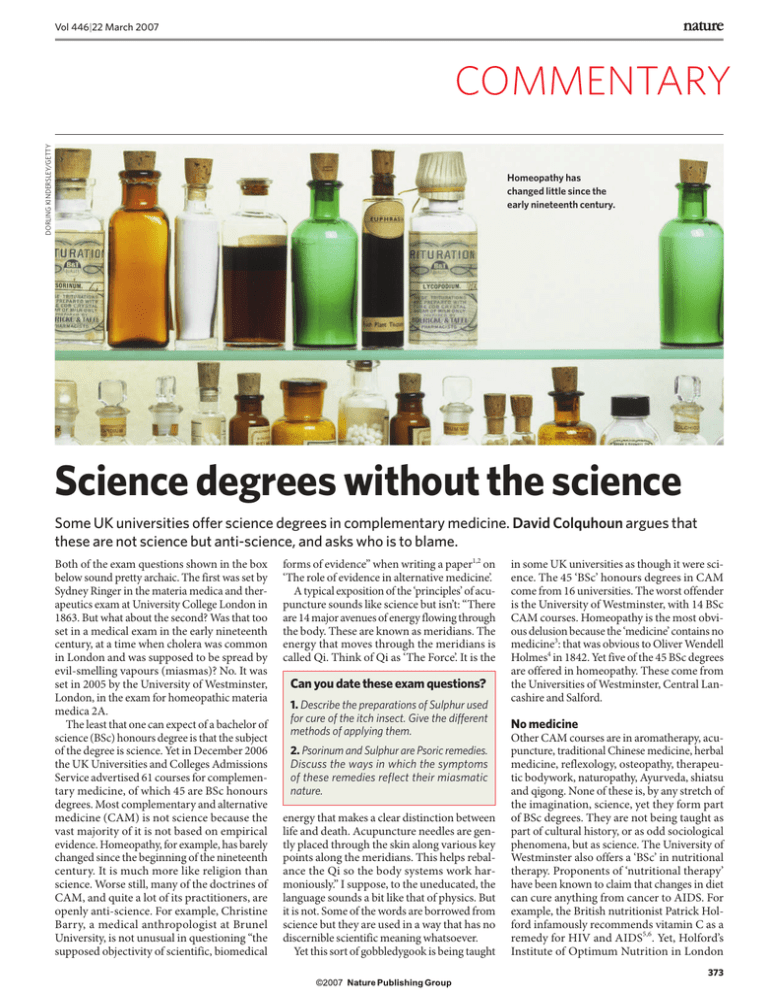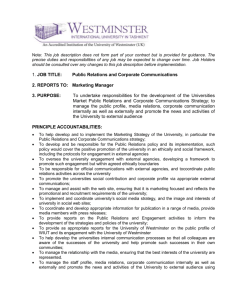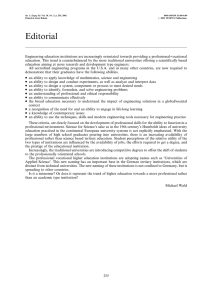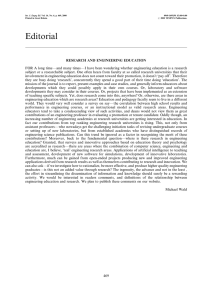Document 12911132
advertisement

Vol 446|22 March 2007 DORLING KINDERSLEY/GETTY COMMENTARY Homeopathy has changed little since the early nineteenth century. Science degrees without the science Some UK universities offer science degrees in complementary medicine. David Colquhoun argues that these are not science but anti-science, and asks who is to blame. Both of the exam questions shown in the box below sound pretty archaic. The first was set by Sydney Ringer in the materia medica and therapeutics exam at University College London in 1863. But what about the second? Was that too set in a medical exam in the early nineteenth century, at a time when cholera was common in London and was supposed to be spread by evil-smelling vapours (miasmas)? No. It was set in 2005 by the University of Westminster, London, in the exam for homeopathic materia medica 2A. The least that one can expect of a bachelor of science (BSc) honours degree is that the subject of the degree is science. Yet in December 2006 the UK Universities and Colleges Admissions Service advertised 61 courses for complementary medicine, of which 45 are BSc honours degrees. Most complementary and alternative medicine (CAM) is not science because the vast majority of it is not based on empirical evidence. Homeopathy, for example, has barely changed since the beginning of the nineteenth century. It is much more like religion than science. Worse still, many of the doctrines of CAM, and quite a lot of its practitioners, are openly anti-science. For example, Christine Barry, a medical anthropologist at Brunel University, is not unusual in questioning “the supposed objectivity of scientific, biomedical forms of evidence” when writing a paper1,2 on ‘The role of evidence in alternative medicine’. A typical exposition of the ‘principles’ of acupuncture sounds like science but isn’t: “There are 14 major avenues of energy flowing through the body. These are known as meridians. The energy that moves through the meridians is called Qi. Think of Qi as ‘The Force’. It is the Can you date these exam questions? 1. Describe the preparations of Sulphur used for cure of the itch insect. Give the different methods of applying them. 2. Psorinum and Sulphur are Psoric remedies. Discuss the ways in which the symptoms of these remedies reflect their miasmatic nature. energy that makes a clear distinction between life and death. Acupuncture needles are gently placed through the skin along various key points along the meridians. This helps rebalance the Qi so the body systems work harmoniously.” I suppose, to the uneducated, the language sounds a bit like that of physics. But it is not. Some of the words are borrowed from science but they are used in a way that has no discernible scientific meaning whatsoever. Yet this sort of gobbledygook is being taught in some UK universities as though it were science. The 45 ‘BSc’ honours degrees in CAM come from 16 universities. The worst offender is the University of Westminster, with 14 BSc CAM courses. Homeopathy is the most obvious delusion because the ‘medicine’ contains no medicine3: that was obvious to Oliver Wendell Holmes4 in 1842. Yet five of the 45 BSc degrees are offered in homeopathy. These come from the Universities of Westminster, Central Lancashire and Salford. No medicine Other CAM courses are in aromatherapy, acupuncture, traditional Chinese medicine, herbal medicine, reflexology, osteopathy, therapeutic bodywork, naturopathy, Ayurveda, shiatsu and qigong. None of these is, by any stretch of the imagination, science, yet they form part of BSc degrees. They are not being taught as part of cultural history, or as odd sociological phenomena, but as science. The University of Westminster also offers a ‘BSc’ in nutritional therapy. Proponents of ‘nutritional therapy’ have been known to claim that changes in diet can cure anything from cancer to AIDS. For example, the British nutritionist Patrick Holford infamously recommends vitamin C as a remedy for HIV and AIDS5,6. Yet, Holford’s Institute of Optimum Nutrition in London 373 COMMENTARY Teaching anti-science UNIV. WESTMINSTER offers ‘top-up modules’ for a BSc accredited by the University of Bedfordshire. Similarly, the Centre for Nutrition Education and Lifestyle Management offers a BSc in Nutritional Therapy ‘validated’ by Middlesex University. University validation of private institutions clearly doesn’t work. In 1992, John Major’s government gave the title of ‘university’ to what had previously been polytechnics or colleges of higher education. These institutions were largely devoted to teaching. They did little research so were quite different from what had been called a university before then. They also brought with them some courses that were not remotely like those taught in older universities. This has given rise to talk of ‘mickey mouse’ degrees in, say, golfcourse management, baking or embroidery that do not have the intellectual content of degrees in maths or French. Their existence shows that universities have changed a lot. One can argue about whether that is a good thing, but that does not matter much for the present argument. NATURE|Vol 446|22 March 2007 Some universities, including the University of Westminster, award science degrees in homeopathy. liams, is quite right when he says that one would What matters here is that degrees in things not want a government agency dictating to unisuch as golf-course management are honest. versities what degrees they should or should They do what it says on the label. That is quite not provide. But in that case, the QAA seems to different from awarding BSc degrees in sub- be totally redundant. Their own rules prevent jects that are not science at all, but are posi- them from doing anything useful. Today, unitively anti-science. In my view, they are plain versities are beset by all manner of regulators, dishonest. One sad consequence of this is the assessors and rankings. They cost a great deal enormous harm it does to the reputations of of time and money, for little noticeable gain. All the 16 post-1992 universities that run CAM of us who do research (rather than talk about degrees in their very proper wish to be recog- it) know the disastrous effects that the Research nized as comparable institutions to the older Assessment Exercise has had on research in the universities. A few older universities also have United Kingdom: short-termism, intellectual departments that teach anti-science as fact (for shallowness, guest authorships and even disexample, complementary medicine groups at honesty. It seems that we can’t expect anything the Universities of Southampton and York and useful from regulators. The real responsibility the Open University CAM course) but at least lies with university vice-chancellors, and it is they don’t award degrees in the subject. they who must take the blame. Why don’t regulators prevent BSc degrees in anti-science? The Quality Assurance Agency Who’s in charge? for Higher Education (QAA) claims that “We Why do vice-chancellors allow their universisafeguard and help to improve the academic ties to award BSc degrees in anti-science? In standards and quality of higher education 2003 I wrote twice to the vice-chancellor of in the UK.” It costs taxpayers Westminster about the teach£11.5 million (US$22 million) “It seems that ing of such degrees, but got no annually. It is, of course, not we can’t expect response. One reason is presumably that degrees in antiunreasonable that governments should ask whether universities anything useful scientific subjects exist because are doing a good job. But why from regulators.” there is a public demand for has the QAA not noticed that them. They are vocational some universities are awarding BSc degrees degrees and people are smart enough to know in subjects that are not, actually, science? The that magic is a good way to make money. The QAA report on the University of Westminster universities make money too, by getting bums courses7 awards a perfect score for ‘curriculum on seats. So what’s the problem? Some vicedesign, content and organization,’ despite this chancellors seem to have lost sight of what content consisting largely of what I consider universities are for. Before 1826, universities in to be early-nineteenth-century myths, not England, but not Scotland, were largely theoscience. It happens because the QAA judges logical seminaries; after the foundation of the courses only against the aims set by those who University of London in 1826 (later University run the QAA, and if their aims are to propagate College London), universities became places magic as science, that’s fine. where people sought, as best they could, to The chief executive of the QAA, Peter Wil- discover the truth8. They became places you 374 could turn to for independent thought and opinions, undistorted by financial interests. The best ones still are, but that independence of thought has never been more at risk. The pressure now is not towards theology, but towards corporatization. If newspaper editors can make money from astrology columns, why shouldn’t universities get in on the act? A few of them have, but in doing so they become the antithesis of what a university should be. The Committee of Vice-Chancellors and Principals (renamed ‘Universities UK’ post1992) has been remarkably unhelpful. Their only intellectual contribution to the debate appears to be in a 2003 report on Universities and the NHS9 in which Martin Harris, then vice-chancellor of Manchester University, says “Until very recently, so-called ‘alternative therapies’ have been viewed with scepticism by the medical profession. However, more doctors and nurses are now recognizing that these treatments can and do work.” One wonders who gave him that idea. An astrologer perhaps? Or a homeopath? ■ David Colquhoun is in the Department of Pharmacology at University College London, UK. 1. Colquhoun, D. DC’s Improbable Science Page www.ucl. ac.uk/Pharmacology/dc-bits/quack.html. 2. Barry, C. A. Soc. Sci. Med. 62, 2646–2657 (2006). 3. Editorial Lancet 336, 690 (2005). 4. Holmes, O. W. Homeopathy and its Kindred Delusions www.quackwatch.org/01QuackeryRelatedTopics/ holmes.html (1842). 5. Goldacre, B. The Guardian 17 February (2007). 6. www.patrickholford.com/content.asp?id_Content=1778 7. QAA Other Subjects Allied to Medicine www.qaa.ac.uk/ reviews/reports/subjectlevel/q171_01.pdf (2000). 8. Desmond, A. The Politics of Evolution: Morphology, Medicine and Reform in Radical London (Univ. Chicago Press, 1992). 9. Harris, M. Universities and the NHS: Partners in Care http:// bookshop.universitiesuk.ac.uk/downloads/partnersincare. pdf (2003). Acknowledgement. I am grateful to P. Williams of the QAA for information and help.





